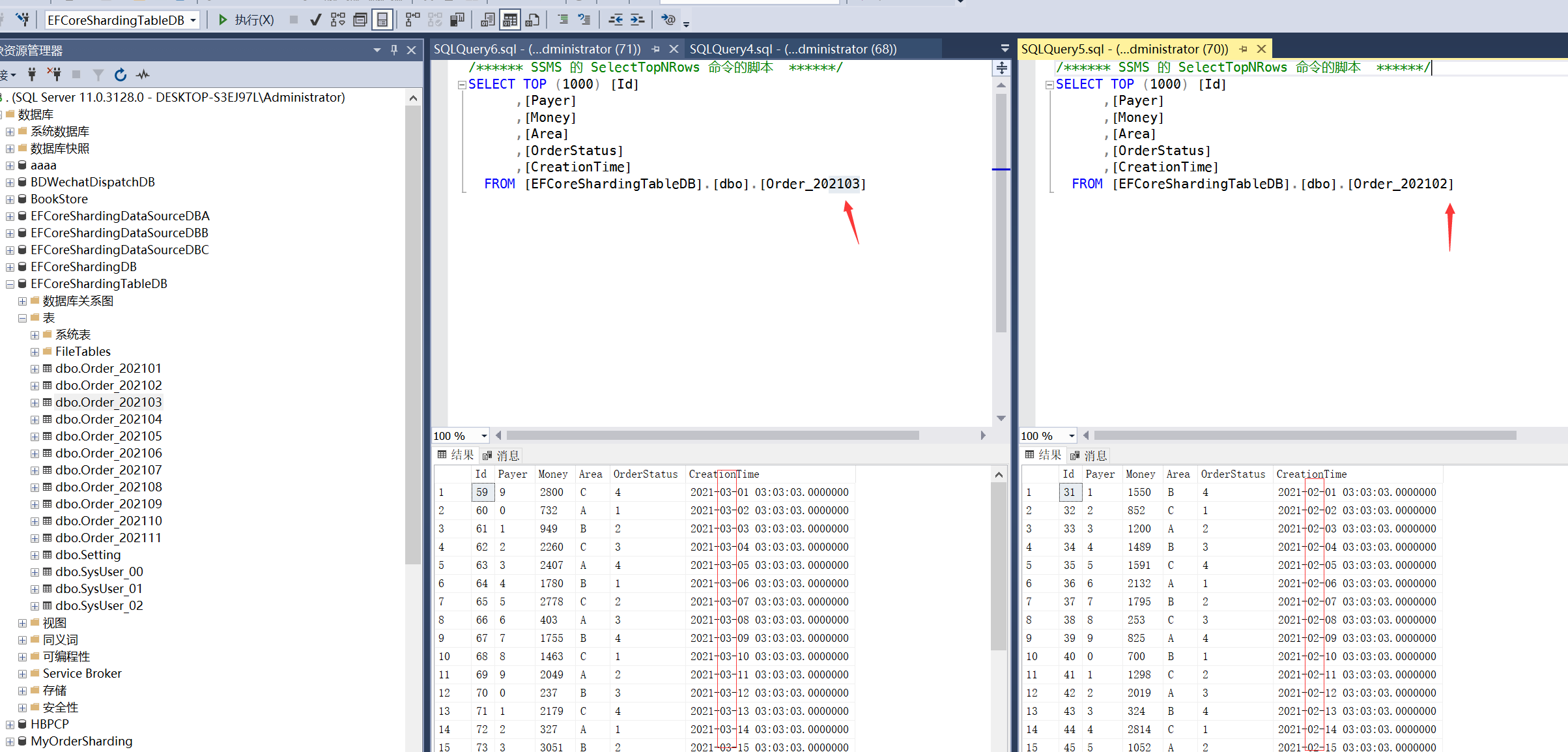初始化
# 介绍
分表介绍
sharding-core支持自定义分表,流式聚合,多表join- 虽然框架已经将分表封装的用户毫无感知了,但是也是需要使用者有部分分表的概念的了解
- 我们把表A分成A1,A2,A3这三张表,如果你在数据库里还是看到了表A那么就说明程序是不正确的,表A在分表后其实不应该存在了(大部分情况下)
IShardingTableDbContext这个接口在你需要支持分表的情况下需要加,如果您只是分库那么就不需要添加这个接口
# Demo
本次分表的demo源码:EFCoreShardingTable (opens new window)
# 分表使用
先拟定一个场景目前有用户表SysUser和订单表Order,再添加一个Setting配置表,用户我们按用户id进行取模分表,订单我们按时间月进行分表,配置表我们部分表
首先创建一个空的aspnetcore web api。
# 安装ShardingCore
# 请对应安装您需要的版本
PM> Install-Package ShardingCore
# 请对应数据库版本
PM> Install-Package Microsoft.EntityFrameworkCore.SqlServer
2
3
4
# 创建对象
public enum OrderStatusEnum
{
NoPay=1,
Paying=2,
Payed=3,
PayFail=4
}
public class Order
{
public string Id { get; set; }
public string Payer { get; set; }
public long Money { get; set; }
public string Area { get; set; }
public OrderStatusEnum OrderStatus { get; set; }
public DateTime CreationTime { get; set; }
}
public class SysUser
{
public string Id { get; set; }
public string Name { get; set; }
public string SettingCode { get; set; }
public string Area { get; set; }
}
public class Setting
{
public string Code { get; set; }
public string Name { get; set; }
}
2
3
4
5
6
7
8
9
10
11
12
13
14
15
16
17
18
19
20
21
22
23
24
25
26
27
28
# 创建DbContext
这样我们就创建好了三张表,接下来我们创建我们的DbContext
public class MyDbContext:AbstractShardingDbContext,IShardingTableDbContext
{
public MyDbContext(DbContextOptions<MyDbContext> options) : base(options)
{
}
protected override void OnModelCreating(ModelBuilder modelBuilder)
{
base.OnModelCreating(modelBuilder);
modelBuilder.Entity<Order>(entity =>
{
entity.HasKey(o => o.Id);
entity.Property(o => o.Id).IsRequired().IsUnicode(false).HasMaxLength(50);
entity.Property(o=>o.Payer).IsRequired().IsUnicode(false).HasMaxLength(50);
entity.Property(o => o.Area).IsRequired().IsUnicode(false).HasMaxLength(50);
entity.Property(o => o.OrderStatus).HasConversion<int>();
entity.ToTable(nameof(Order));
});
modelBuilder.Entity<SysUser>(entity =>
{
entity.HasKey(o => o.Id);
entity.Property(o => o.Id).IsRequired().IsUnicode(false).HasMaxLength(50);
entity.Property(o=>o.Name).IsRequired().IsUnicode(false).HasMaxLength(50);
entity.Property(o => o.Area).IsRequired().IsUnicode(false).HasMaxLength(50);
entity.Property(o => o.SettingCode).IsRequired().IsUnicode(false).HasMaxLength(50);
entity.ToTable(nameof(SysUser));
});
modelBuilder.Entity<Setting>(entity =>
{
entity.HasKey(o => o.Code);
entity.Property(o => o.Code).IsRequired().IsUnicode(false).HasMaxLength(50);
entity.Property(o=>o.Name).IsRequired().IsUnicode(false).HasMaxLength(50);
entity.ToTable(nameof(Setting));
});
}
public IRouteTail RouteTail { get; set; }
}
2
3
4
5
6
7
8
9
10
11
12
13
14
15
16
17
18
19
20
21
22
23
24
25
26
27
28
29
30
31
32
33
34
35
36
37
38
39
自定义标题
- 构造函数必须是
DbContextOptions<MyDbContext>或者DbContextOptions OnModelCreating并不是说分表必须要这样,而是你原先efcore怎么使用就怎么使用,efcore配置对象有两种一种是DbSet+Attribute,另外一种是OnModelCreating+ModelBuilder,你可以选择你原先在用的任何一种AbstractShardingDbContext这个对象是可以不继承的,但是如果要使用分表分库你必须实现IShardingTableDbContext这个接口,因为这个接口实现起来都是一样的所以默认你只需要继承AbstractShardingDbContext就可以了IShardingTableDbContext这个接口在你需要支持分表的情况下需要加,如果您只是分库那么就不需要添加这个接口
# 创建虚拟路由
- 订单表按月分表,这边我们把订单从2021年1月份开始到现在具体
//创建时间按月分表
public class OrderVirtualTableRoute:AbstractSimpleShardingMonthKeyDateTimeVirtualTableRoute<Order>
{
public override DateTime GetBeginTime()
{
return new DateTime(2021, 1, 1);
}
//注意一定要配置或者采用接口+标签也是可以的
public override void Configure(EntityMetadataTableBuilder<Order> builder)
{
builder.ShardingProperty(o => o.CreationTime);
}
}
//用户Id取模3分表
public class SysUserVirtualTableRoute:AbstractSimpleShardingModKeyStringVirtualTableRoute<SysUser>
{
public SysUserVirtualTableRoute() : base(2, 3)
{
}
public override void Configure(EntityMetadataTableBuilder<SysUser> builder)
{
builder.ShardingProperty(o => o.Id);
}
}
2
3
4
5
6
7
8
9
10
11
12
13
14
15
16
17
18
19
20
21
22
23
24
25
26
# Startup配置
ConfigureServices(IServiceCollection services)配置
public void ConfigureServices(IServiceCollection services)
{
services.AddControllers();
services.AddShardingDbContext<MyDbContext>().UseRouteConfig(op =>
{
op.AddShardingTableRoute<SysUserVirtualTableRoute>();
op.AddShardingTableRoute<OrderVirtualTableRoute>();
op.AddShardingTableRoute<MultiShardingOrderVirtualTableRoute>();
}).UseConfig(op =>
{
//当无法获取路由时会返回默认值而不是报错
op.ThrowIfQueryRouteNotMatch = false;
op.UseShardingQuery((conStr, builder) =>
{
builder.UseSqlServer(conStr).UseLoggerFactory(efLogger);
});
op.UseShardingTransaction((connection, builder) =>
{
builder.UseSqlServer(connection).UseLoggerFactory(efLogger);
});
op.AddDefaultDataSource("ds0",
"Data Source=localhost;Initial Catalog=EFCoreShardingTableDB;Integrated Security=True;");
op.AddReadWriteSeparation(sp =>
{
return new Dictionary<string, IEnumerable<string>>()
{
{
"ds0", new List<string>()
{
"Data Source=localhost;Initial Catalog=EFCoreShardingTableDB;Integrated Security=True;"
}
}
};
}, ReadStrategyEnum.Loop, defaultEnable: true);
}).AddShardingCore();
}
2
3
4
5
6
7
8
9
10
11
12
13
14
15
16
17
18
19
20
21
22
23
24
25
26
27
28
29
30
31
32
33
34
35
36
37
38
重要
!!!MyDbContext请勿注册成单例、ServiceLifetime.Singleton!!!
!!!MyDbContext请勿注册成单例、ServiceLifetime.Singleton!!!
!!!MyDbContext请勿注册成单例、ServiceLifetime.Singleton!!!
新建一个扩展方法用来初始化ShardingCore和初始化种子数据
public static class StartupExtension
{
public static void UseShardingCore(this IApplicationBuilder app)
{
app.ApplicationServices.GetRequiredService<IShardingBootstrapper>().Start();
}
public static void InitSeed(this IApplicationBuilder app)
{
using (var serviceScope = app.ApplicationServices.CreateScope())
{
var myDbContext = serviceScope.ServiceProvider.GetRequiredService<MyDbContext>();
if (!myDbContext.Set<Setting>().Any())
{
List<Setting> settings = new List<Setting>(3);
settings.Add(new Setting()
{
Code = "Admin",
Name = "AdminName"
});
settings.Add(new Setting()
{
Code = "User",
Name = "UserName"
});
settings.Add(new Setting()
{
Code = "SuperAdmin",
Name = "SuperAdminName"
});
List<SysUser> users = new List<SysUser>(10);
for (int i = 0; i < 10; i++)
{
var uer=new SysUser()
{
Id = i.ToString(),
Name = $"MyName{i}",
SettingCode = settings[i % 3].Code
};
users.Add(uer);
}
List<Order> orders = new List<Order>(300);
var begin = new DateTime(2021, 1, 1, 3, 3, 3);
for (int i = 0; i < 300; i++)
{
var order = new Order()
{
Id = i.ToString(),
Payer = $"{i % 10}",
Money = 100+new Random().Next(100,3000),
OrderStatus = (OrderStatusEnum)(i % 4 + 1),
CreationTime = begin.AddDays(i)
};
orders.Add(order);
}
myDbContext.AddRange(settings);
myDbContext.AddRange(users);
myDbContext.AddRange(orders);
myDbContext.SaveChanges();
}
}
}
}
2
3
4
5
6
7
8
9
10
11
12
13
14
15
16
17
18
19
20
21
22
23
24
25
26
27
28
29
30
31
32
33
34
35
36
37
38
39
40
41
42
43
44
45
46
47
48
49
50
51
52
53
54
55
56
57
58
59
60
61
62
63
64
Configure(IApplicationBuilder app, IWebHostEnvironment env)配置
public void Configure(IApplicationBuilder app, IWebHostEnvironment env)
{
if (env.IsDevelopment())
{
app.UseDeveloperExceptionPage();
}
//建议补偿表在迁移后面
using (var scope = app.ApplicationServices.CreateScope())
{
var myDbContext = scope.ServiceProvider.GetService<MyDbContext>();
//如果没有迁移那么就直接创建表和库
myDbContext.Database.EnsureCreated();
//如果有迁移使用下面的
// myDbContext.Database.Migrate();
}
app.ApplicationServices.UseAutoTryCompensateTable();
// app.UseShardingCore();
app.UseRouting();
app.UseAuthorization();
app.UseEndpoints(endpoints =>
{
endpoints.MapControllers();
});
app.InitSeed();
}
2
3
4
5
6
7
8
9
10
11
12
13
14
15
16
17
18
19
20
21
22
23
24
25
26
27
28
# efcore日志(可选)
这边为了方便我们观察efcore的执行sql语句我们这边建议对efcore添加日志
Startup添加静态数据
public static readonly ILoggerFactory efLogger = LoggerFactory.Create(builder =>
{
builder.AddFilter((category, level) => category == DbLoggerCategory.Database.Command.Name && level == LogLevel.Information).AddConsole();
});
2
3
4
在所有builder.UseSqlServer(conStr);
都改成builder.UseSqlServer(conStr).UseLoggerFactory(efLogger);
启动后我们将可以看到数据库和表会被自动创建,并且会将种子数据进行插入到内部供我们可以查询测试
